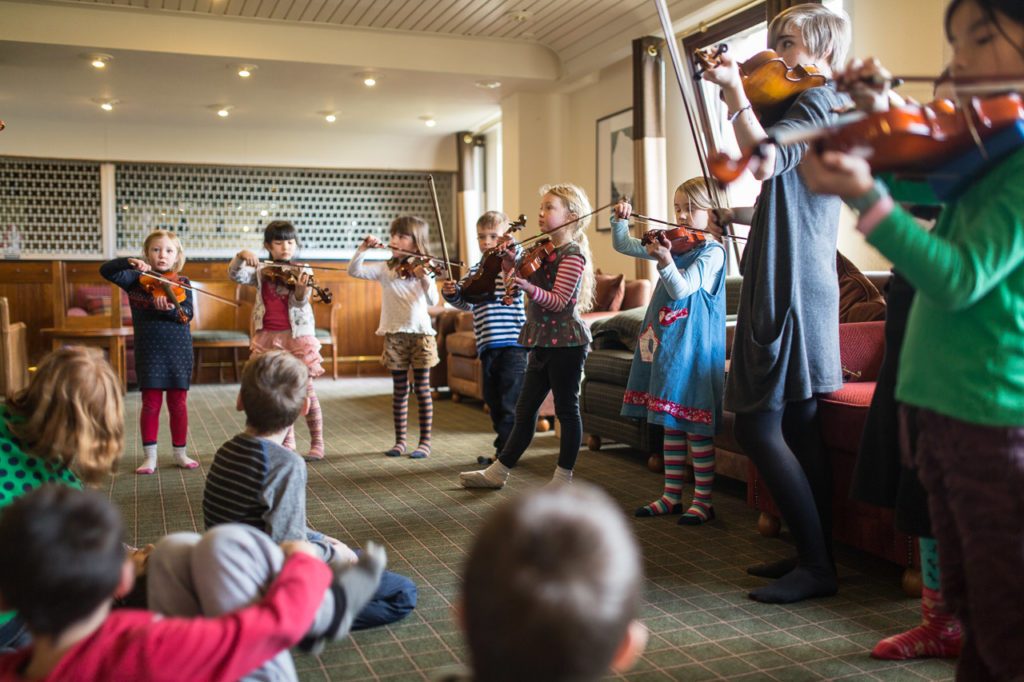Teaching Your Child to Cope With Peer Pressure

Growing up is never easy. As children take their first steps away from the safety net of their home and their parents, and into the wider world of school, friends and extracurricular activities, they have to quickly learn to adjust and adapt. For the first time, they must seek the approval of not just their family, but also their friends and their social circle. Their choices now begin to be governed not just by what they want, but what the other children they interact with expect from them. [wp_ad_camp_1]
This pressure to conform to the attitudes, values, and behaviors of other children – who may either belong to your child’s social group or may be part of a group that your child aspires to belong to – is known as peer pressure.
How does peer pressure affect your child?
Although most parents tend to interpret peer pressure as encouragement to indulge in disobedient, dysfunctional or otherwise unhealthy behaviors, peer pressure can often be a strong motivator for your child. Peer groups have been found to instill a sense of healthy competition in children, and can drive your child to excel at studies, in extracurricular activities such as sports and cultural undertakings, and can even influence positive behavioral traits such as honesty, loyalty, and generosity.
Negative peer pressure, on the other hand, can skew your child’s perception of right and wrong, since your child will often bend the rules and overreach boundaries to participate in activities that he/she would have otherwise refrained from. Peer pressure acts on your child in several ways – from their external appearance to their likes and dislikes, or even their academic performance, the influence of a child’s peer group on their life choices is deep and far-reaching.
And yet, most children will – at some point or the other – have to learn how to cope with peer pressure, and this process will prepare them with social skills they will need in their later years. So, how do you as a parent recognize when peer pressure is harming your child? How do you protect your child from being sucked into negative behaviors when everyone else is telling them otherwise?
Identify the warning signs
Peer pressure begins to take a toll on your child quite early, and the first, most important thing you can do is to be prepared for when that happens. Some of the warning signs you need to watch out for include:
- Changes in your child’s behavior, especially around certain groups of friends
- Your child expressing their inability to fit in
- An increased focus on image and appearance
- Dramatic changes in your child’s hobbies and preferences
- A sudden drop in your child’s academic performance
- Your child is suddenly more irritable, sullen or pensive
Helping your child to cope
As a parent, you are your child’s immediate and most important support system and can help them stay grounded. While it is important for your child to be social, you must also teach them to know when and how to draw the line. Here are some things you can do to help your child be better prepared to deal with peer pressure:
Communicate often
A non-judgemental conversation with your child about their choices and friends will help you better understand their situation. Don’t be too harsh with critiquing your child, even if you happen to notice any sudden, unfavorable changes in their behavior; criticism will only shut your child out, making it harder for you to understand them. Instead, be firm and compassionate in trying to understand what your child is really going through, so you can talk them through the process.
Know who your child’s friends are
Don’t relegate your knowledge of your child’s peer group to faceless names. Invite your child’s friends over occasionally, and take the time to learn about their families. If possible, initiate conversations with the parents of your child’s friends so that you have a clearer idea of their backgrounds and values, and know to watch for potential red flags.
Encourage your child to participate in hobbies and activities that they like
The possibility of your child meeting like-minded friends increases exponentially in such scenarios. Here, your child will find it easier to be themselves, instead of squeezing their personalities into a mold, to be able to fit in.
Teach your child the importance of saying ‘No’
Your child should know that it is okay to distance themselves from any activity or person that they aren’t comfortable with. Also talk about the consequences of saying ‘No’ to your child: too many children buckle under the pressure of being excluded from the ‘cool group’. Let your child know that you will always be there to love and support them unconditionally, even when it feels like the entire world is going the other way. Finally, talk your child through various uncomfortable scenarios that they might encounter, and demonstrate to them how and when they can decline from participating.
Set clear boundaries
At the end of the day, your child will model their behavior on the example that you set for them. Set clear boundaries about what is and isn’t considered acceptable in your household. Your child must be aware of these boundaries and be taught to respect them. Be strict and firm with any deviations, so that your child is clear about your expectations from him/her.
Don’t be afraid to mediate
Many parents are reluctant to interfere with their children’s social group, for fear that it will alienate their child even further. However, should the need arise, don’t hesitate to involve yourself in the situation. Talk to the other children’s parents or your child’s school teachers about any problematic behaviors that you think are stemming from your child’s peer group. If necessary, limit the amount of time your child is allowed to spend with children you consider a negative influence.
Encourage your child’s positive choices
Children thrive on encouragement and positive reinforcement. Let your child know when they are making good choices so that they instinctively gravitate towards similar actions and people.
Teach your child the importance of compassion
A child who is sympathetic to their peers will also be quicker to recognize situations where they are being treated unfairly. Teaching your child about compassion will also prevent them from indulging in behaviors that could be detrimental to the wellbeing of others.
Peer pressure is not just applicable to adolescents and teens, but can also affect much younger children. In toddlers and pre-schoolers for instance, peer pressure may demonstrate itself by way of social exclusion, which your child may either suffer or be a part of. If unattended, this can negatively impact your child’s self-confidence and make them more gullible in their later years. Begin talking to your child about peer pressure early, and keep these channels of communication open so that your child has all the tools he/she needs to become a confident, well-adjusted human being.



